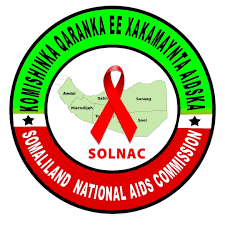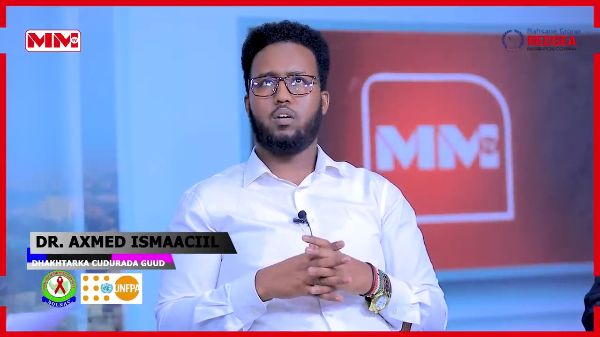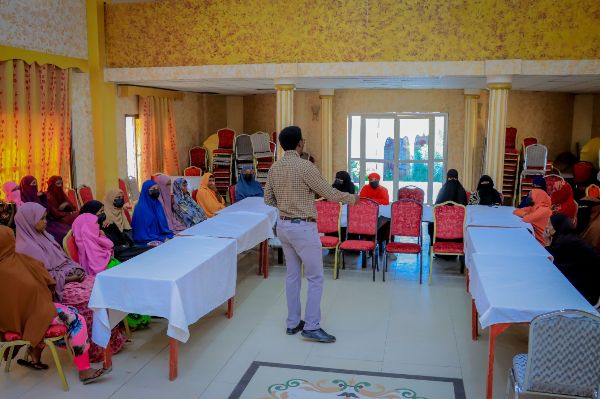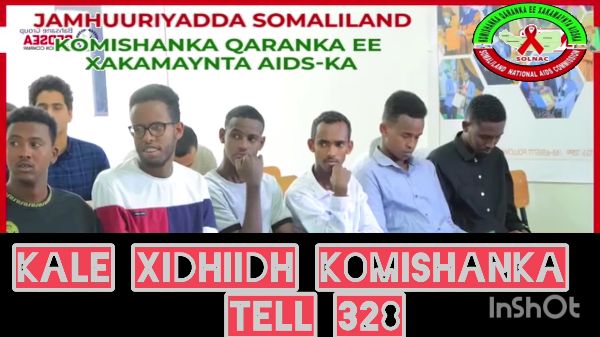
Shining a spotlight on global inequality in the fight against HIV/AIDS: the view from Somaliland
Shining a spotlight on global inequality in the fight against HIV/AIDS: the view from Somaliland
On World AIDS Day, a look at ongoing work to overcome stigma, close information gaps, and strengthen health information systems in Somaliland.
 The President of Somaliland, Muse Bihi Abdi, meets with individuals at the Washington Institute for Near East Policy in Washington, DC during a March 2022 visit. Photo by SOLNAC (Somaliland National AIDS Commission), used with permission.
The President of Somaliland, Muse Bihi Abdi, meets with individuals at the Washington Institute for Near East Policy in Washington, DC during a March 2022 visit. Photo by SOLNAC (Somaliland National AIDS Commission), used with permission.The First Tranche
SOLNAC, in partnership with William & Mary (W&M), is aiming to shine a spotlight on inequality by increasing local capacity to understand the drivers of local HIV epidemics, identify gaps in services among those most likely to acquire and transmit HIV, and provide evidence to support tailored interventions to reduce HIV transmission. This includes incorporating and expanding on tools and methods that AidData has developed and incubated, for example through spatial layer integration. W&M’s Ignite lab has as one aim to work with SOLNAC to address the lack of routine surveillance data, an urgent need as the lack of local information significantly limits national efforts to scale up effective HIV programs. Ignite would work with SOLNAC to build research administration and management capacities, research integrity oversight, and biostatistics and data analysis capacities by training local stakeholders who want to know where to target resources to prevent new HIV infections.
Overcoming stigma
With limited resources, SOLNAC works hard to battle the stigmas associated with HIV/AIDS for people living with HIV. It is an uphill challenge: a 2020 health and demographic survey found that 49 percent of women aged 15-49 have negative attitudes towards people living with HIV, and 64 percent of women aged 15-49 have reported not buying fresh vegetables from a shopkeeper living with HIV. The Commission employs several strategies to make the best use of limited resources. This year, SOLNAC was able to incorporate a quarterly nutrition support program for PLHIV, a measure that has the effect of encouraging them to stick with their treatment. Covering basic needs is critical: 72 percent of PLHIV in Somaliland are not engaged in any form of employment at all. SOLNAC leverages its responsibility to act as an inter-agency coordinator among national government ministries and agencies. This includes working with the Ministry of Education to integrate HIV education and awareness into the national school curriculum. SOLNAC recently established a working relationship with the Ministry of Religious Affairs and many of the country’s religious leaders to jointly combat misconceptions among the population on how HIV is transmitted. The aim is to shift the narrative which, until now and especially among the less-educated, has been one where HIV is seen as an act of God. Having the religious community as SOLNAC’s partner is important, as the majority of people in Somaliland obtain their information from mosques, which they consider their most reliable and trusted source. There are encouraging early signs that this joint community awareness and advocacy effort will reduce stigma and discrimination and increase testing rates. SOLNAC also coordinates and acts as liaison with UN agencies and international and national NGOs to prevent duplication and overlap of projects and services and ensure smarter allocation and targeting of resources.
Gaps in information
SOLNAC has responsibility for coordinating and harmonizing HIV/AIDS data collection efforts across Somaliland and seeing that these data inform policy making, facilitate sub-national targeting, resource allocation, program, management, monitoring and evaluation. Public health infrastructure is lacking in Somaliland, as are resources, tools, and technologies, the combination of which puts lives at risk. Research is a high priority in the National Strategic Plan (NSP) for the Somaliland HIV and AIDS Response (2021-2023). Among other elements, it mandates SOLNAC and its partners to:
- Define the indicators, data collection, and reporting requirements for tracking NSP progress;
- Improve routine HIV/AIDS data collection, management, and quality;
- Strengthen leadership and coordination of HIV/AIDS Monitoring, Evaluation, Accountability, and Learning (MEAL); and
- Strengthen systems to undertake HIV/AIDS and related surveillance, surveys, and research.
Strengthening the health information system
The people of Somaliland are young—nearly half under the age of 15 and 75 percent under 30. They are smart and ambitious, keen to build their country. But in a refrain common to many Global South nations, SOLNAC faces challenges recruiting and keeping top staff. The Commission is heavily and unnecessarily dependent on external experts and consultants. In-house qualitative and quantitative measurement capacity is weak. In addition to brain drain, trained health professionals are lost to the private sector or international donors, multilaterals, and NGOs. These challenges illustrate the need for more research training, as limited research capacity is constraining the ability of SOLNAC to allocate limited HIV resources where they will have the most impact. Given these challenges, how does a low-income country such as Somaliland meet the call to action for equality issued by World AIDS Day and ensure it is not forgotten for the other 364 days in the year? Equality starts with the implementation of a platform that informs the gaps and strategies unique to specific populations, cities, regions, and countries in order to scale-up interventions and services that will achieve epidemic control. National-level data are available to inform the HIV response, but local data at the district level are often unavailable or inadequate. The lack of granularity at the district level prevents the strategic use of resources. Local programs do not know the characteristics of those most likely to acquire and transmit HIV or where to reach them. Although the HIV epidemic is global, all transmission is local. To be effective, local responses should be tailored to the local context and guided by empirical evidence and epidemiological principles. This approach dovetails well with one of the goals of UNAIDS World AIDS Day 2022—to “ensure the sharing of technology to enable equal access to the best HIV science, between communities and between the Global South and North.” Inequalities between the Global North and South have received renewed attention in recent years in a number of areas: COVID-19 vaccine access and treatment, for example. Another is around climate change, as we witnessed at the recent COP 27 conference, where poorer countries came together to demand more resources for a crisis the cause of which they share little of the blame but much of the catastrophic effects. Somaliland, for example, is being devastated by drought, especially in the eastern regions. Meanwhile, the burden of HIV falls particularly heavy on some populations and geographies. As UNAIDS notes elsewhere, young women in Africa remain disproportionately affected:“in 19 high-burden countries in Africa, dedicated combination prevention programmes for adolescent girls and young women are operating in only 40% of the high HIV incidence locations.”
All three of these crises are global in nature and, in an interconnected world, require concerted, collective responses, sufficiently resourced and tailored to local environments and circumstances.
About the authors
Dr. Ismail Muhumed Ayeh, MD, MPH/HP is the Executive Director of SOLNAC. He is also the Dean of the Medical School at Amoud University, in Borama, Somaliland, an OB/GYN, and a former Director of Borama General Hospital.
The Somaliland National AIDS Commission (SOLNAC) is a governmental body established in 2005 by Presidential decree, providing national leadership, strategic vision and oversight for the country’s HIV response. It is responsible for coordinating governmental and non-governmental HIV programs. In addition to advising the Somaliland Parliament, SOLNAC works closely with seven national ministries—Health, Education, Justice, Religion, Communications, Social Affairs, Youth and Sports. The Ministry of Health provides diagnosis and treatment services to the PLHIV population; the Ministry of Justice provides legal aid services; the Ministry Employment and Social Affairs supports socio-economic needs. The Ministry of Information, Culture and National Guidance oversees awareness campaigns through broadcast and online media.
Carrie Dolan is an Assistant Professor of Kinesiology and Health Sciences and the Director of Ignite, a global health research lab at William & Mary’s Global Research Institute. Most recently Ignite has conducted research on global health resource allocation in St. Vincent and the Grenadines and in sub-Saharan Africa.
Alex Wooley is Partnerships and Communications Director at AidData. AidData has previously conducted health data systems strengthening projects in Uganda, Zambia and Cote d’Ivoire. Alex Wooley is AidData's Director of Partnerships and Communications.








